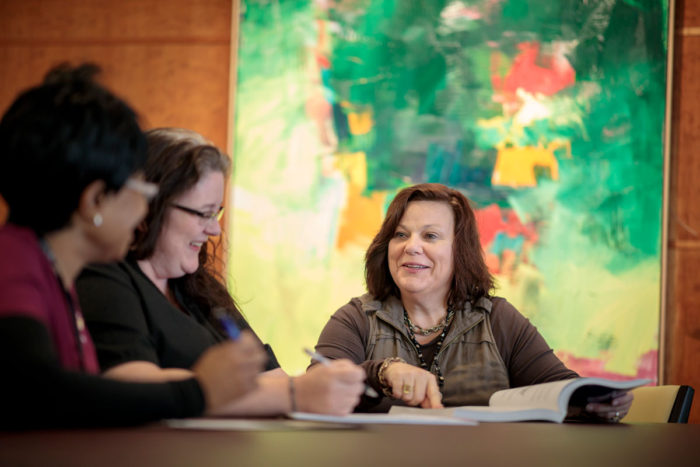HR’s Faulkner believes in investing in others to make a difference
She recently won an award for her role in medical assistant internship program
 Matt Miller
Matt MillerWashington University Human Resources employee Tracey Faulkner talks with former interns Alfreda Buckley (far left) and Christine Johnson at the Farrell Learning and Teaching Center on Feb. 6.
Tracey Faulkner believes in second chances. As a human resources employee at Washington University School of Medicine in St. Louis, she also understands that some people need help finding their place in the world.
When Faulkner and Legail Chandler, the university’s vice chancellor for human resources, created a medical assistant internship program in 2016 at the School of Medicine for unemployed or underemployed residents of north St. Louis County and north St. Louis, Faulkner saw some of the trainees struggling. She took it upon herself to serve as a mentor and counselor to those who needed extra motivation or support. She also hosted weekday study sessions on the Medical Campus and one night a week at her home.
“There were people from all different backgrounds,” said Faulkner, a clinical recruitment consultant who recently received the MoWINS Grant Partnership award for her role in the internship program. “Some of them had enormous responsibilities at home. A few didn’t know how they were going to pay for groceries for the next week.”
As the first class of interns completed its training, Faulkner realized that helping some of the students had gotten her through a heart-wrenching time. She lost her 28-year-old son, Kevin, in a car accident in May 2015. He had struggled with anxiety, ADHD and addiction, which made both school and holding a job difficult.
The struggles Faulkner’s son faced reminded her that each person has unique circumstances and a purpose. “Often all that is needed is an outstretched hand to help someone up and words of encouragement to keep going,” she said.
Christine Johnson, a medical assistant in the Department of Neurology, said Faulkner was incredibly supportive of the trainees in the internship program and took extra steps to make sure they knew she believed in them.
“She is very honest and a great communicator, and seeing how she responds to the people in her professional life is inspiring,” Johnson said. “I also know she has been through a lot of hardship in her life, but she still has a very positive attitude and is one of the strongest people I know.”
Faulkner met Johnson when she was a housekeeper at the medical school. She found out that Johnson, who has a bachelor’s degree and had been a manager in retail, recently had moved in with her parents so they wouldn’t have to go into a nursing home. Faulkner noticed Johnson’s interpersonal skills and recommended that she apply for the medical assistant program.
Johnson, who had always thought about working in health care, sailed through the program and even tutored some of her fellow classmates. Today, she loves her job.
Another success story, Destinee Harris started the medical assistant program when her son was 3 months old. She is a medical assistant in the Department of Medicine and plans one day to become a nurse.
She said Faulkner helped the trainees at every step and was encouraging when Harris didn’t think she could make it through the program because of her son.
“She helped me think through the consequences of dropping out, and I am so glad I listened to her,” Harris said. “She was more like a mother — very nurturing.”
Chandler commends Faulkner for giving so much time and support to the trainees while also recruiting for more than 80 clinical openings.
“She goes more than the extra mile to be creative and flexible in finding new ways to find the best candidates for a wide range of nursing and clinical jobs,” Chandler said. “She is part of a team of people in human resources, who, like her, successfully manage a challenging workload and routinely take on extra projects because they can get it done and because they love this place.”
On March 31, nine more graduates of the medical assistant program will walk across the stage at the Eric P. Newman Education Center to receive their certificates. The program will have graduated a total of 39 medical assistants. Faulkner said she hopes the graduates will see a future for themselves and be able to provide stability for their families. She also hopes some of them will continue their education.
“It helps to know that I’ve made a difference,” she said. “What we are here for is to invest in other people. There is so much more happiness when we are outward-looking than when we focus on ourselves.”






